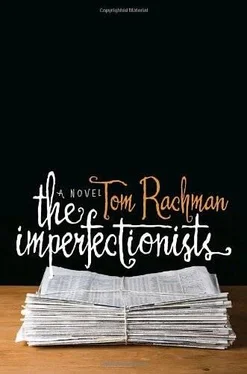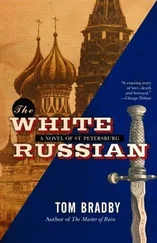The dog yawns.
"See, I have to get to the end of my sentence. You won't have it otherwise."
The dog's eyelids sink shut.
Over the coming weeks, the phone calls increase.
"Money, money, money," Oliver tells Schopenhauer. "What am I supposed to do? I don't run the Ott Group."
Kathleen is talking into the machine: "… and I'm going to need you at that staff meeting. I've told everyone you'll be there, so I'd appreciate it if you'd call me back."
At the Valle dei Cani, Oliver switches Schopenhauer to the extendable leash, which allows the animal to play with the dogs but not to run away. The other owners watch Oliver with amusement: he retreats to the edge of the grassy bowl, behind a tree, with a detective novel pressed to his nose, unwilling to engage human eyes as he clings to the world's longest and most unmanageable leash. Every few minutes, he must rush over to Schopenhauer and remove the cord from an animal or a person. Oliver never speaks on these occasions, even if spoken to. He unties his friend, hurries back to his tree, resumes reading-or, rather, resumes pretending to read.
He has no friends in Rome except Schopenhauer. He has no friends anywhere except Schopenhauer, unless his companion from school days, the pensioner Mr. Deveen, is still alive. But Mr. Deveen must be dead by now. How old would he be? He'd not have reached the twenty-first century, not with all those cigarettes. Dear man. Can't condemn him. He must have been lonely. That's the best way to explain it.
Dinner that evening is bigoli al tartufo nero, and Schopenhauer makes an ungodly mess of it again. Long pasta is not his strong point. "They warned me that you bayed," Oliver says, "but never about your table manners."
The two best friends embark on another expedition to the darkened upper floors. Oliver steals through the rooms, peeking at the paintings under tarpaulin: Modigliani's portrait of a Gypsy; Leger's green bottles and black bowler hats; Chagall's blue chickens leaping over the moon; the English country landscape as seen by Pissarro.
Oliver stands before the Turner: a disintegrating ship and the spray of the sea; the way Turner captured water, the sloshing bulk of it. He could stare at it for hours-and Turner is not particularly his thing. What is his thing, then? At Yale, his thesis (aborted when Boyd fell ill) was "Wreck in the Moonlight: Caspar David Friedrich and the Nineteenth-Century German Landscape." But it's preposterous to speak of "his thing" when it comes to art.
As he admires the Turner, his gaze flits from one aspect to another on the canvas, impatient for the pleasure of the next detail, rapt by the process of looking. "Beauty," he tells Schopenhauer, "is all I care about." Only the drowning figures in the foreground are a disappointment: visual noise within an otherwise impeccable panorama. Turner flubbed it, not simply because his human forms were inept but because the human form can never be rendered beautiful. A face is the opposite of beauty, lurching as it will from laughter to brutality. "How," Oliver asks, "can people be attracted to each other?"
His ear twitches at the incessant ringing downstairs. It's after midnight. "Can they not leave me alone?" From the answering machine comes the drone of his eldest brother, Vaughn, calling from Atlanta. Presumably to ask if Oliver has an Italian girlfriend yet. The family fears he is gay. They don't like gays. Or Communists. What about art historians? Same difference. He's not, though. Not what? An art historian. He's an art fancier. An appreciator of beauty. Only, not of faces. "You would have liked Mr. Deveen," he tells Schopenhauer. "But I would have been afraid to bring you two together-what if you hadn't gotten along? Still, I think you would have. You know, I was assigned to Mr. Deveen; I didn't pick him. It was luck. You see, there was this adopt-a-pensioner scheme at my school. Everyone had to do it." Unlike his three siblings, Oliver was sent to a boarding school in England, his father not wanting such an irritating little boy mincing around the house. "I went every Saturday to Mr. Deveen's house," Oliver tells Schopenhauer. "Made him tea, did the chores, the shopping, which in his case meant cigarettes and Irish whiskey-what brand was it? And the New Statesman. You wouldn't know that, Schop-it's a magazine for leftists and art historians. And actors, I imagine, which is what he'd been. In healthier days, he virtually lived at the galleries. He had the most amazing catalogs. I can fairly say, Schop, that Mr. Deveen introduced me to art. What an education! He could talk about absolutely any period, and in such a captivating way. Though he didn't fancy contemporary art-he had a bee in his bonnet about Pollock and just about everyone who came after that. I used to ask him about artists, and he'd respond with the exhibition, as in, 'Mr. Deveen, what do you think of Klee?' To which I'd get: 'The Collections of Sir Edward and Lady Hulton at the Tate in 1957-top shelf.' I'd bring down the catalog and he'd flip through, explaining it all, sipping his Irish whiskey with milk, which I had to keep warming on the stove. (It's harder heating milk than you think, Schop-it keeps sticking to the bloody pot.) That smell, though-I'll never forget it. And the same chipped mug. He used to say, 'Don't destroy it, I beg you!' Had the finest baritone voice, too. Did radio plays for BBC Manchester in his day, and you could hear why. Ah, well," Oliver says. "It was the whiskey, I think. Not anything else. He wasn't. It wasn't. I mean, I don't condemn him. He was alone and… Yes, and the whiskey. Not his fault. Well, anyway, enough fussing."
Oliver asks the housekeepers to make involtini di vitello for dinner. He isn't crazy about the dish, but his wagging companion is an avid consumer. Schopenhauer eats almost all of it-too much, it turns out, for he suffers an upset stomach. Oliver plays nursemaid for the next twenty-four hours, cleaning up puddles of dog vomit.
Once the worst is over, he reads aloud from The Hound of the Baskervilles as the Hound of the Aventine dozes at his hip. Oliver knows this book so well that "reading" is hardly the word-he wanders about in it, renews old acquaintances, allows Dr. Watson's lank thread to reel him gently forward. This evening, however, the pages remain dry and yellow. He raises Schopenhauer's chin.
"You must get well!" he says. "You must be better soon!" He pulls Schopenhauer nearer. "I've spent too much time as a nursemaid already." He strokes the dog. "And I'm awful at it. When I nursed Boyd, I was constantly bothering him. I tried not to, but I couldn't help it. He used to tell me, 'You must be thrilled that I'm sick-you can use me as an excuse to drop out of Yale. You'll never have to graduate now.' But I thought he'd wanted me home to look after him. I mean, I thought so. I sometimes wonder if he called me back home to test me-to see if I'd comply. And, being such a softie, I did, of course, and he hated that. He used to say, Women comply, men defy.' Ah, well," Oliver says. "And, I mean, was I really going to end up as an academic? Me, lecturing? Can't see it. I hope I was useful to him. He certainly adored you, my little friend! Do you remember my father? He liked to throw that squeaky rubber rat of yours. Do you remember him throwing it down the lawn for you in Atlanta? And you'd just sit there, doing nothing, staring at the thing with such disdain." Oliver smiles. "Oh, come on-you know exactly the look I'm talking about. And my father-hardly a man to fetch objects-going down the garden with his cane, picking up your silly rat, throwing it again. And you sitting there, yawning!"
The phone rings, and Kathleen leaves another message: she has set a date for the staff meeting and Oliver must address the employees about the Ott Group's plans.
"What plans?" Oliver asks Schopenhauer.
Читать дальше












